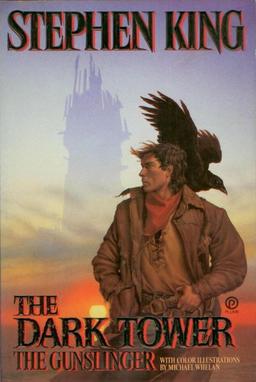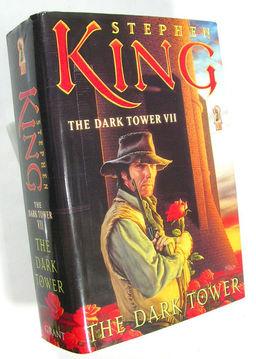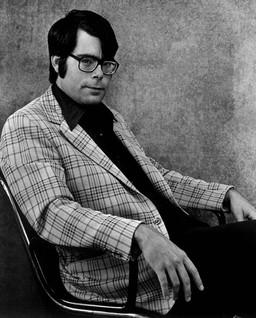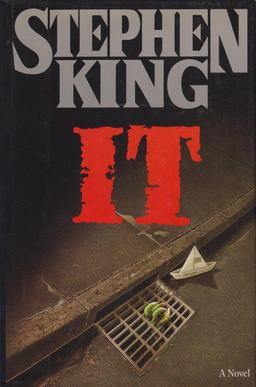Tell Me Why
 Someone please tell me. Why? Why do we do this to ourselves, we devotees of science fiction, horror, and (especially) fantasy? What did we do to deserve this? What crime did we commit in some previous existence that we now have to expiate with such bitter tears? Judge, I deserve to know! I demand answers!
Someone please tell me. Why? Why do we do this to ourselves, we devotees of science fiction, horror, and (especially) fantasy? What did we do to deserve this? What crime did we commit in some previous existence that we now have to expiate with such bitter tears? Judge, I deserve to know! I demand answers!
But… I see that you too have questions, like, “What the hell are you talking about?”
Let me explain. I just finished The Dark Tower: The Gunslinger by Stephen King. Seduced by the very cool Michael Whelan cover, I bought this damn thing in 1988 when it first came out and this week I figured it was finally time to read it.
There can be no rational explanation for my behavior, as the book is only the first of seven volumes that King wrote to tell this story (not counting a standalone book that he added after the main sequence was finished), and of course (of course!) they get longer and longer. This one was not much over 200 pages, but apparently King soon shook off his delirium and said “What am I doing? I’m STEPHEN FLIPPING KING!!!” and the succeeding volumes rapidly ballooned to 600 pages, 700… until the final book, 2004’s The Dark Tower, tipped the scales at almost 1,100 pages.
Considering that I’m still waiting on George Martin to put up or shut up before death (his or mine) intervenes, and finish A Song of Ice and Fire, vindicating all of us who’ve already hacked our way through over 4,000 pages of that cursed tale, starting another ambitious, multivolume phonebook series is sheer, unadulterated insanity.
Why? WHY?! Why do we do this to ourselves? People who read westerns or mysteries know no such madness. Oh, they have series all right, but not like we do. Manacling ourselves to extended epics that take up half their writers’ and readers’ lives, built out of mile-high stacks of ever-expanding, elephantine tomes – this seems to be the particular curse of fantastic fiction readers. (I won’t even go into the fact that the 1988 edition I read has been rendered obsolete by a revised edition that King published in 2003; it took him so long to write the sequence that he felt the style of the first book didn’t fit with the rest any more. Thanks Steve, but by God, this is the one I paid my $10.95 for twenty seven years ago, and this is the one I’m reading!)

Oh, the story itself? It was fine. If you’re a little quicker off the starting line than I am, you already know that the book is a sort of post apocalyptic quest story, heavy on the mythic and allegorical overtones.
It is also — no surprise, given its author — a kitchen sink book; King throws in a bit of everything. There are pieces of various classic Dying Earth venues, images from spaghetti westerns (also, unless I miss my guess, a bit or two from an odd 1966 Jack Nicholson “existential western” made for Roger Corman, The Shooting), echoes of Arthurian romance, allusions to the Bible, dabs of gnostic theology, a riff or two from Richard Matheson’s The Incredible Shrinking Man and Clifford Simak’s Ring Around the Sun, and on and on.
Also, there is one major inspiration that King mentions in an afterword — Robert Browning’s great poem, “Childe Roland to the Dark Tower Came.” That, however, is a potential problem.
The power of the poem lies in the enigma at its heart — though it is far from nonsense, no one is sure exactly what it is about, including its author. (Browing claimed — perhaps disingenuously — that the poem simply transcribes a dream that he had.)
Browning was an artist great enough and confident enough to open a door into darkness… and walk away, leaving the lights off, and trusting his readers to draw their own inferences from the unlit void.
But that ain’t Stephen King, folks. For good or ill, for much of his career he has been unable to leave a curtain discreetly drawn or a dark corner unilluminated. In some ways it is silly to complain about his tendency to excess; that’s just who he is and it gives his writing much of its energy and immediacy.

This lack of restraint does not always work to the advantage of every tale though, especially when King aims at seriousness and significance, and that downside occasionally showed in this book — the slangy, the jokey, and the over-the-top sometimes undercut the deep mythic resonances King was trying to evoke. (If the man were charged with doing a straight retelling of King Lear, I swear he wouldn’t think Cordelia’s death scene were complete until he had included three gross-outs, two fast food references, and a fart joke.)
King is a peerless popular entertainer who has too often been unable to resist chasing after the white whale of Big Meaning. It is generally a bad sign when he abandons small towns and ordinary lives and starts yearning for cosmic significance or metaphysical weight. This honorable ambition has led him to fumble a few endings over the years.
I will never forget my incredulity after finishing It, for instance. This relentless, terrifying thing (that kept me genuinely frightened for most of a long book) turned out to be…a giant spider from the fourteenth dimension… or something. And oh yeah, there was a sort of turtle, and it was like, an eternal battle of good and evil, and… oh, never mind!
That was 1986, so “WTF” still crouched in the womb of unborn time (if King can try for portentous weight, hey, so can I) but I came very close to giving it birth as I closed the book. Actually, what I came closest to was flinging the volume across the room, but I had invested in a hardcover, and brother, was it heavy.
All criticisms fly in the face of King’s phenomenal success, of course, but what the heck — I paid full price for my opinion, and I will always think that it would have been so much better (just plain scarier) for Pennywise to have simply been the unregenerate soul of an evil man — a ghost, in fact.
 But something at once so prosaic and so enigmatic does not lend itself to cosmic significance — or at least not in the way that King wanted. (I’m still cheesed after all these years — can you tell?)
But something at once so prosaic and so enigmatic does not lend itself to cosmic significance — or at least not in the way that King wanted. (I’m still cheesed after all these years — can you tell?)
All this together does not fill me with confidence in King’s ability to provide a satisfactory conclusion in the case of this protracted tale; maybe he did, maybe he didn’t. (I understand, without knowing any specifics about the rest of the series, that his ultimate ending proved contentious with many readers. Should I profess to be surprised?)
But all of that is beside the point. I enjoyed The Gunslinger well enough, and you’re welcome to agree or disagree with my view of Stephen King’s writing. (You too paid admission and have the right to praise the popcorn or complain about it, as you will.)
But I have a question, as I look out across the decade that it will probably take me to work my way through the rest of this series, a decade during which, every time I’m considering what to read next, I’ll guiltily look over at my shelf and see The Drawing of the Three, The Waste Lands, Wizard and Glass and the rest, staring at me… calling me… reproaching me. That question is — why did I bring this on myself in the first place?
It’s fruitless to speculate about the psychology of Stephen King when I can’t even understand my own perverse behavior. I just want to know. Someone — anyone — tell me. Why did I do it?
Can’t help you, O irrational one.
But I can tell you MY particular cure.
His name was Robert Jordan (real name, ironically, Rigney).
About five books into the VAST SPRAWL of the Wheel Of Time, I said, whoa. Where’s this going? When will it end?
And the poor guy died, before the echo of my question could even bounce off the walls.
This is why I have yet to pick up Mr. Martin’s VAST SPRAWL. He has to finish first.
: )
King makes me think of van Gogh. He needs someone to come in and take the book away from him when he’s done writing it. 🙂 I remember reading Duma Key. I swear he must have hated writing it. Because when the book was done, he spent another four or five chapters just destroying the characters.
Just have to take this moment to remind anyone reading this that THE BOOKS OF THE SHAPER trilogy is COMPLETE, DONE, FINISHED, CONCLUDED and offers an entire Epic Fantasy story WITH AN ENDING in only three volumes: SEVEN PRINCES, SEVEN KINGS, and SEVEN SORCERERS. Yes, some reviewers have said there’s enough ideas in the first book for ten others, but that’s beside the point. Here’s a series that has a Beginning, a Middle, and an End. Like a king-sized Snickers Bar, it’s bound to satisfy. Why wait for an unfinished series when you can read the whole epic story NOW?
http://johnrfultz.com/2012/05/23/seven-princes-review-round-up/
[End of shameless self-promotion.]
I love King but the first Gunslinger was a tough read. I think it shows how much improvement he has had over the years. I’ve heard the series gets better as it goes but King was much more experienced in the later novels.
I hate to say this but I’ve never picked up the Wheel of Time series. I respect Jordan but my first few reads of his were Conan and Carter of Mars books that honestly missed their mark. He does much better in his own worlds. Now, I’m afraid to start as it would take years to read all the volumes of stuff.
Martin will never finish the series. I guarantee it. HBO will finish the series.
Jordan cured me too, but only of reading Jordan. I read the The Eye of the World when it came out, never envisioning the fourteen volume monster of deforestation that it would become – I thought it might just be the kick off for a trilogy. (Remember those? They were popular once, I recall.) But I really disliked the book, and was thus saved from a life of hard labor and paper cuts. (No offense to the many folks who love Jordan and his epic.)
If it is any consolation, I once shot a book: Anne Rice’s “The Witching Hour”.
I had looked forward to reading it for so long, and then, when I did, it was horribly, insultingly bad. So I took the damned thing up into the hills and shot it with a .45 — and I found it quite telling that the bullet didn’t go all the way through that monstrosity.
Shades of Elvis and Robert Goulet…
I wonder, if you lined up all of The Wheel Of Time books (in hardcover, let’s say), what caliber bullet would be required to pass through each and every one?
Eh, could be worse. I started reading the Dark Tower books back in about 1990, when they were first being released, so I got to endure that long, long wait after Wizard & Glass.
Which is still small potatoes compared to the 20(?) years I waited for Glen Cook to finish his Dread Empire series. Although there were special circumstances in that case.
At this point, I figure that I have so many books queued up that I might just as well read what I want when I want. If that means I get part way through a series and lose interest (WoT; Deathstalker), so be it. If that means that I get really hooked by a series that will probably never be continued (Michael Reaves’ Shattered World), again, so be it.
(Which is not, of course, to say that I don’t _prefer_ to find an amazing series that I can follow from start to finish …)
I think I’ve figured out why we do it, but my answer is long enough that I’ll have to make it a post of its own. It’s not an answer I’ve seen elsewhere. I hope it’s all right with you, Thomas, if I quote from this post.
You’re welcome to whatever you need, Sarah. I’m eagerly awaiting your explanation for our particular pathology!
For me it is the characters. I like to go back to familiar friends and places in these epics. The wait between books has caused me to stop in a series. This happened after Gunslinger and midway thru the Sword of Truth series. When the books are too large, I struggle to find the time to go back and reread the earlier books to bring me up to speed. Too many new good books and not enough time. I like John Fultz’s suggestion of starting with a completed series. I’ll have to take a look at the Shaper trilogy. (Shameless plugs are okay in my book.)